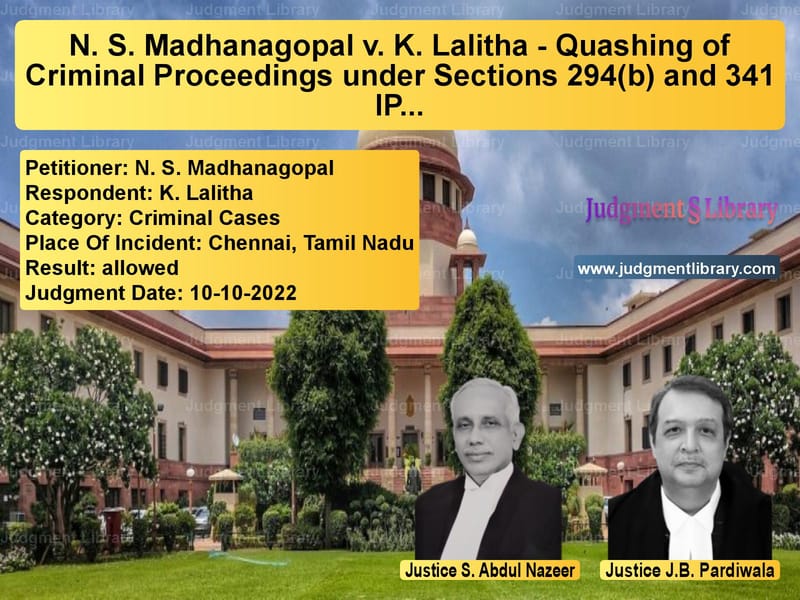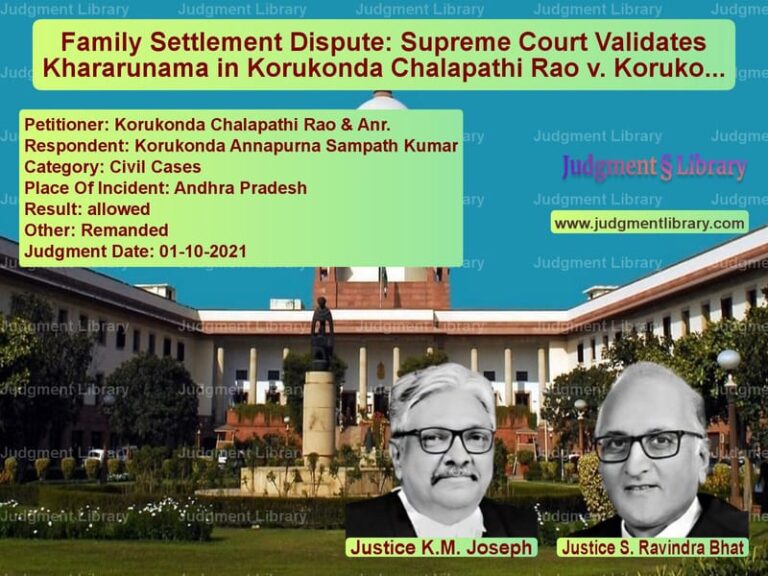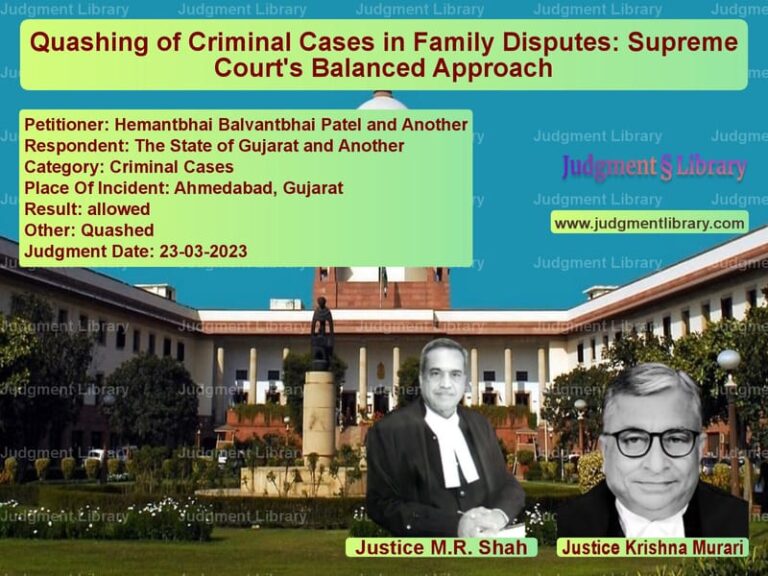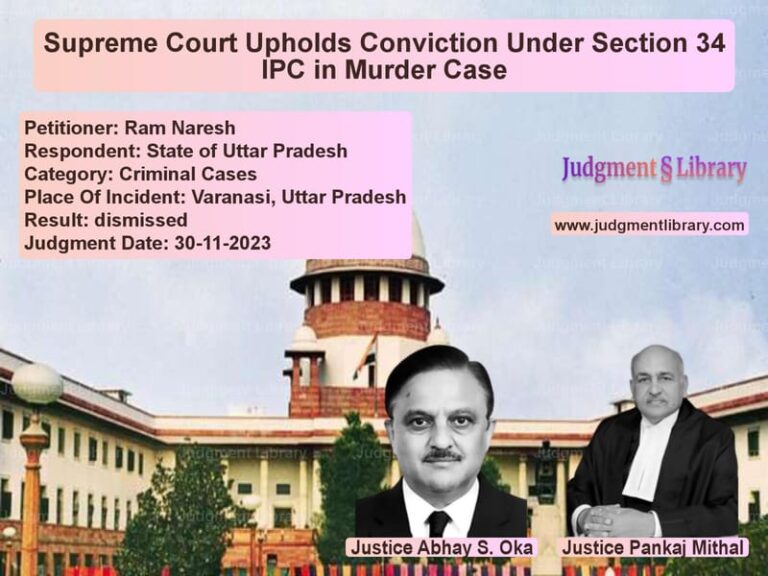N. S. Madhanagopal v. K. Lalitha – Quashing of Criminal Proceedings under Sections 294(b) and 341 IPC
The present case concerns an appeal filed by N. S. Madhanagopal and another appellant challenging the order passed by the High Court of Judicature at Madras, which rejected their petition seeking the quashing of criminal proceedings under Sections 294(b) and 341 of the Indian Penal Code (IPC). The complaint had been filed by K. Lalitha, the respondent, against the appellants alleging the commission of offenses relating to obscene words and wrongful restraint. The case stems from an altercation between the parties concerning a waste water issue in the residential area, leading to verbal abuse and later police involvement.
The appellants, in their appeal, contended that no offense had been committed under Section 294(b) and Section 341 of the IPC. They argued that the words allegedly used by them did not meet the definition of obscenity under Section 294(b), and that the allegations of wrongful restraint were baseless. The High Court had dismissed the plea for quashing the proceedings, and the appellants now sought the Supreme Court’s intervention to quash the criminal case filed against them.
Petitioner and Respondent Arguments
Petitioner’s Arguments:
- The appellants argued that the words used by them were not obscene and did not meet the threshold required under Section 294(b) of the IPC. They emphasized that mere verbal altercations or exchange of unpleasing words did not amount to obscenity, as defined in law.
- The appellants further contended that there was no wrongful restraint involved in the incident, as the complainant was not physically obstructed from going anywhere, and the charges under Section 341 IPC were therefore unsubstantiated.
- The appellants argued that the police complaint filed by the respondent was frivolous and lacked merit, as the verbal altercation was a result of a larger dispute concerning water flow and related construction in their residential area. They asserted that the use of harsh words did not give rise to any criminal liability.
Respondent’s Arguments:
- The respondent, K. Lalitha, argued that the appellants had used obscene and humiliating language, which was not only offensive but also caused emotional distress. The respondent referred to the incident on 16.04.2018 when the appellants allegedly used “unparliamentary” words and threatened her, an action she argued was in violation of Section 294(b) of the IPC.
- In relation to the charge of wrongful restraint, the respondent contended that the appellants had obstructed her from discharging her duties as a treasurer of the Sadagopan Enclave Residents Association. She claimed that she was physically stopped from performing her role and further stated that the appellants were aggressive and prevented her from carrying out her responsibilities.
- The respondent emphasized that the police had found merit in her complaint, and the proceedings should therefore continue without being quashed. She maintained that the actions of the appellants were defamatory and that legal action was necessary to protect her dignity.
Key Issues and Supreme Court’s Ruling
The Supreme Court considered the following key issues in the case:
1. Whether the Words Used Were Obscene
The Court first considered whether the words allegedly used by the appellants fell under the definition of obscenity as outlined in Section 294(b) of the IPC. The Court referred to earlier judgments, including *P.T. Chacko v. Nainan* (1967 KLT 799), and emphasized that not all offensive language or unkind words qualify as obscene. The test of obscenity, the Court observed, is whether the words used tend to deprave and corrupt those whose minds are open to immoral influences.
The Court concluded that the words used by the appellants did not meet this test and were merely harsh, abusive words, which could not be classified as obscene. The Court held that Section 294(b) was not applicable in this case, as there was no evidence that the words used had a tendency to deprave or corrupt the minds of others.
2. The Allegation of Wrongful Restraint
The Court also examined the allegation of wrongful restraint under Section 341 of the IPC. To establish wrongful restraint, the respondent needed to prove that the appellants had intentionally obstructed her from going to a place where she had a legal right to go. The Court found that no such obstruction had been proven, as the respondent did not provide evidence that she had been physically restrained from carrying out her duties. The Court noted that there was no substantial proof of any physical restraint or obstruction that would amount to wrongful restraint under the law.
3. Quashing of Criminal Proceedings
The Court considered the principles governing the quashing of criminal proceedings under Section 482 of the Cr.P.C., which allows the High Court to quash proceedings when there is no sufficient ground to proceed with the case. The Court agreed with the appellants that the complaint was vague and lacked substantial legal merit. The Court emphasized that no criminal case should proceed if the allegations do not disclose a cognizable offense, and in this case, the allegations did not meet the threshold required to continue with criminal proceedings under Sections 294(b) and 341 of the IPC.
Conclusion
The Supreme Court allowed the appeal and quashed the criminal proceedings against the appellants. The Court held that the words used by the appellants did not constitute obscenity under Section 294(b) of the IPC and that the allegations of wrongful restraint were also unfounded. The Court emphasized that criminal proceedings should not be allowed to continue based on vague and unsubstantiated allegations that do not meet the legal threshold for cognizable offenses.
This judgment underscores the importance of ensuring that criminal complaints are based on valid and substantiated claims and that legal actions should not be used for trivial matters that do not meet the criteria for criminal liability. It reinforces the principle that criminal proceedings should be quashed when the complaint does not disclose an offense under the law.
Impact and Implications
The ruling has significant implications for cases involving verbal altercations and the application of obscenity laws under Section 294(b) of the IPC. It highlights the need for clear evidence of malice or corruption in cases of alleged defamation or verbal abuse. The decision also clarifies the scope of Section 341 on wrongful restraint, emphasizing that physical obstruction is a necessary element for the offense. This case serves as a reminder that courts must carefully scrutinize criminal complaints before allowing them to proceed, ensuring that they are based on legitimate legal grounds.
Petitioner Name: N. S. Madhanagopal.Respondent Name: K. Lalitha.Judgment By: Justice S. Abdul Nazeer, Justice J.B. Pardiwala.Place Of Incident: Chennai, Tamil Nadu.Judgment Date: 10-10-2022.
Don’t miss out on the full details! Download the complete judgment in PDF format below and gain valuable insights instantly!
Download Judgment: n.-s.-madhanagopal-vs-k.-lalitha-supreme-court-of-india-judgment-dated-10-10-2022.pdf
Directly Download Judgment: Directly download this Judgment
See all petitions in Murder Cases
See all petitions in Bail and Anticipatory Bail
See all petitions in Fraud and Forgery
See all petitions in Theft and Robbery Cases
See all petitions in Judgment by S. Abdul Nazeer
See all petitions in Judgment by J.B. Pardiwala
See all petitions in allowed
See all petitions in supreme court of India judgments October 2022
See all petitions in 2022 judgments
See all posts in Criminal Cases Category
See all allowed petitions in Criminal Cases Category
See all Dismissed petitions in Criminal Cases Category
See all partially allowed petitions in Criminal Cases Category







